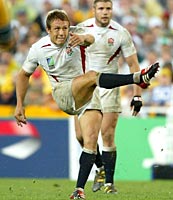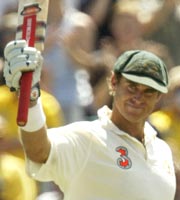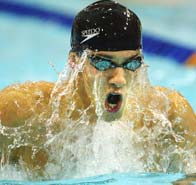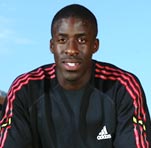Landlocked Switzerland confounded the odds in the fickle winds and unpredictable weather of Auckland's Hauraki Gulf in the first of two unique European sporting achievements during 2003.
Skippered by New Zealander Russell Coutts, a team of renegade Kiwis crewed Alinghi to a five-race sweep over defending America's Cup champions Team New Zealand.
A country without a coastline consequently became the first European nation to win yachting's greatest prize and the world's oldest international sporting trophy.
After 152 years, Ernesto Bertarelli, a 37-year-old biotech billionaire, succeeded where generations of European tycoons had failed while Coutts became the first skipper to win the America's Cup for two countries.
Eight months later and the focus of the sports world had switched to Sydney's Olympic stadium on the evening of November 22.
 With the score tied at 17-all in the rugby World Cup final, England scrumhalf Matt Dawson spotted a gap in the ranks of defending champions Australia.
With the score tied at 17-all in the rugby World Cup final, England scrumhalf Matt Dawson spotted a gap in the ranks of defending champions Australia.
Dawson made crucial ground in the final moments of extra time to set up a field position for flyhalf Jonny Wilkinson.
Everybody on the field and all of the world-record crowd of 82,957 could see what was to come. Wilkinson, a self-confessed obsessive who practises his craft on Christmas Day, snapped a dropped goal with his weaker right foot and England became the first European side to win the Cup.
Coutts and Wilkinson played critical individual roles in two team competitions played at opposite ends of the year in the southern hemisphere.
HAYDEN RECORD
 The rugby was hosted by Australia, a nation of unbounded confidence and abundant opportunity as so dramatically showcased at the 2000 Sydney Olympics.
The rugby was hosted by Australia, a nation of unbounded confidence and abundant opportunity as so dramatically showcased at the 2000 Sydney Olympics.
Despite losing the bewitching skills of Shane Warne, who failed a drugs test before the cricket World Cup in South Africa, Zimbabwe and Kenya, Australia were unbeaten in the one-day tournament. Later in the year, Matthew Hayden broke the individual Test match record when he scored 380 against Zimbabwe with an awesome display of clean, relentless hitting.
In a year without a major soccer tournament, two global championships were staged in two of the great European cities, Barcelona and Paris.
 In the Catalan capital, American Michael Phelps set an unprecedented five world swimming records, surpassing Mark Spitz who broke four world records en route to seven golds at the 1972 Munich Olympics.
In the Catalan capital, American Michael Phelps set an unprecedented five world swimming records, surpassing Mark Spitz who broke four world records en route to seven golds at the 1972 Munich Olympics.
Russian Alexander Popov, at the age of 31, won the 100
The Stade de France hosted the World athletics championships which began at the height of a European heatwave and finished in autumnal rain.
The most heartening team performance came from Ethiopia, one of the world's poorest countries, who gathered more gold than all countries bar the United States and Russia, finishing third in the medals table.
Their double world cross-country champion Kenenisa Bekele outsprinted his mentor Haile Gebrselassie to win the 10,000 and also took the 5,000 bronze. Berhane Adere won the women's 10,000 in the absence of Britain's Paula Radcliffe, who had seemed set to win her first major title.
Radcliffe, who pulled out through injury, was still the women athlete of the year after shattering her own world best time in the London marathon.
DRUGS SCANDAL
Inevitably a drugs scandal erupted during the championships with double women's sprint champion Kelli White testing positive for a stimulant which will be on the banned list from 2004.
 Britain's European 100 metres champion Dwain Chambers was later found to have tested positive for a new designer steroid THG (tetrahydrogestrinone).
Britain's European 100 metres champion Dwain Chambers was later found to have tested positive for a new designer steroid THG (tetrahydrogestrinone).
For the first time since 1998, Tiger Woods did not win one of the four golf majors while Pete Sampras made his long-anticipated retirement from the tennis circuit.
His perennial rival Andre Agassi defied the years to win the Australian Open. In the fourth and last Grand Slam tournament the best of the new generation, Andy Roddick, won the U.S. Open.
Serena Williams and Justine Henin-Hardenne shared the women's titles during a year blighted for the former when her elder sister Yetunde Price was shot dead.
Some constants remained. Lance Armstrong won the Tour de France cycling for a record-equalling fifth time and Michael Schmuacher overcame atrocious weather and a change in the scoring system to win a record sixth Formula One title, overtaking Juan Manuel Fangio.
The death of Cameroon international Marc-Vivien Foe at the age of 28 at a Confederations Cup match in France in June overshadowed the soccer year.
One of the more significant developments in the global game was the purchase of England premier league club Chelsea by Russian billionaire Roman Abramovich. Abramovich poured more than 100 million pounds ($172 million) into the west London club in an audacious bid to show money could buy success.








 © 2025
© 2025